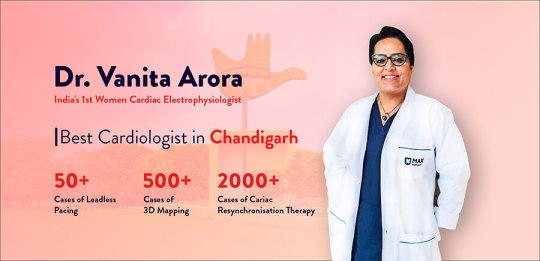Link
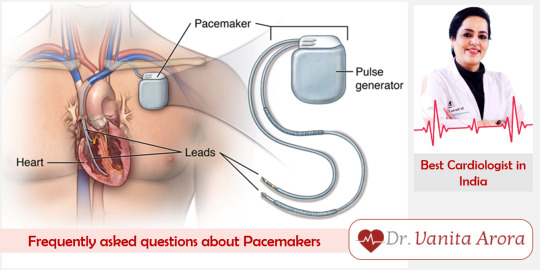
The best cardiologist in India, Dr. Vanita Arora answers frequently asked questions about pacemakers. Learn all about pacemakers from the best heart specialist. Book an appointment today.
0 notes
Link
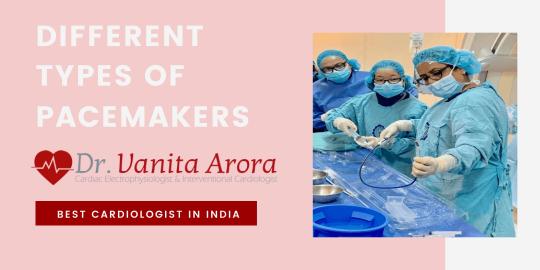
Learn about the different types of pacemakers and leadless pacemaker from renowned doctor for pacemaker and the best cardiologist in India – Dr. Vanita Arora.
0 notes
Link
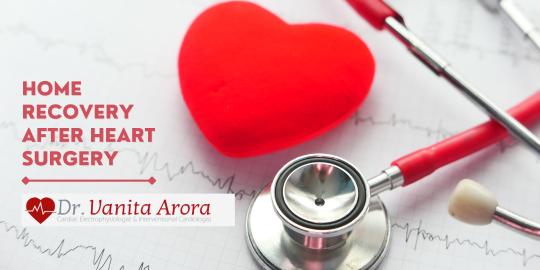
It is important to take extra precautions after your heart surgery and follow the advice of best heart specialist. This will increase your chance of recovering smoothly during this pandemic. Learn more from the best cardiologist in India.
0 notes
Link

Your cardiologist, or heart specialist helps in preventing heart diseases through various screenings and check-ups. Learn about the best cardiologist in Delhi here.
0 notes
Text
What is a Cardiologist?
A Cardiologist is a doctor who specialises in treating conditions and diseases related to the heart. It is important to take care of the most hard working and crucial organ of your body, i.e., your heart.
Heart related problems and disease is one of the leading causes of death for men and women in India. One in every four deaths can be attributed to heart disease. Since heart is such a critical organ, cardiologic care is an important branch of medicine, says the best cardiologist in Delhi NCR, Dr. Vanita Arora.

Cardiology is a complex discipline. Aspiring cardiologists receive an extensive education which includes four years of medical school, three years of training in cardiology. Some cardiologists choose to study further with spending another 1-2 years in specialized training. To understand the intricacies of the human heart, cardiologists end up studying and training for ten or more years.
What does a cardiologist treat?
Your cardiologist, or heart specialist helps in preventing heart diseases through various screenings and check-ups. The common problems treated by the best cardiologist in India include:
1. Coronary heart disease (blockage of heart arteries)
2. Congestive Heart Failure
3. Valvular Heart Disease
4. Arrhythmias
5. Congenital Heart Disease
6. Hypertension
When do you need to see a Cardiologist?
You should see the best cardiologist in Delhi if you have symptoms related to heart or blood vessel problems, including the following:
· Chest pain with or without radiation to jaw, shoulders
· Heart murmur
· Shortness of breath
· Palpitations or irregular pulse
· Dizziness
· Syncope or passing out
· Fatigue
· Leg swelling or edema
· Leg pain
· High Blood Pressure
· High Cholesterol
· Family history of heart disease
What are the tests or procedures done by a Cardiologist?
Your cardiologist will investigate about your medical history before carrying out any tests. They may do a physical exam along with other tests and procedures to which may include the following:
· Electrocardiogram (ECG)
· Blood tests
· Chest x-ray
· Echocardiography
· Stress test
· Heart Monitor
· Angiography
· Electrophysiology study
Choosing the best cardiologist
Patients are often referred to a cardiologist by their physician / family doctors or they consult the best cardiologist when suffering from a heart related problem.
When you are dealing with the well-being of your heart, experience matters the most. The more experience a cardiologist has, the better your treatment results are likely to be. Make sure that you choose the best cardiologist in Delhi with whom you are comfortable talking and who supports your information needs. Reading about the cardiologist’s reviews and what other people have to say can also provide insight into how a doctor practices medicine. All in all, look for a heart doctor who specializes in the prevention of cardiac illness, as well as its diagnosis and treatment.
Dr. Vanita Arora, Director & Head of Cardiac Electrophysiology at Max Hospital, is the best cardiologist in Delhi NCR, Punjab, Haryana, Rajasthan, J&K, Bihar, Uttarakhand and the rest of India. She is a DNB Cardiology, MD Medicine, and MBBS. She has more than 25 years of experience in the field of cardiology and is the 1st women electrophysiologist in India. Dr. Arora has earned Awards like” Rising Star in Cardiology”, “Woman Doctor Entrepreneur of year 2018”, “Chikitsa Ratan” along with several other outstanding achievements in her medical career. Book an appointment today for all your heart related problems by visiting her website www.drvanitaarora.com calling at 9873879994.
#best cardiologist in delhi#Best Cardiologist#best cardiologist in india#Best Cardiologist in Delhi NCR#Best cardiologist in Mumbai
0 notes
Text
Signs & Symptoms of a Heart Attack
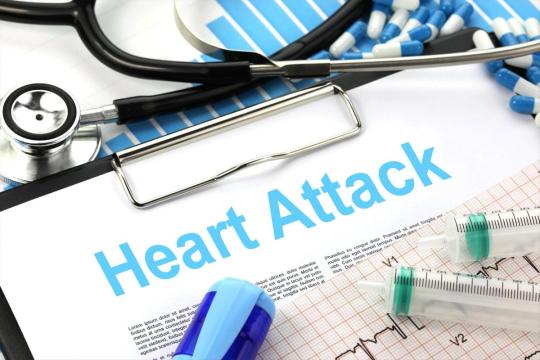
A heart attack, also known as myocardial infarction, can have different presentation among individuals. Heart attack is one of the leading causes of death in both men and women in India. But there may be different symptoms in how men and women may experience heart attack.
Here is a surprising fact: Not all heart problems and heart attacks come with a clear warning sign and you may not even realize it at the time. It may start with an unusual feeling that you are just not feeling well and have symptoms like nausea, shortness of breath, stomach pain or an uncomfortable feeling in your chest. You may be tempted to dismiss these symptoms thinking it is just the flu or acidity. But it may be dangerous and even life-threatening. You should not ignore these symptoms, says Dr. Vanita Arora, the best cardiologist in Delhi, Noida & Gurgaon. These can be warning signs of a heart attack.
What are the warning signs of a heart attack?
If you experience a heart attack, it is because blood supply gets blocked to a part of your heart muscle suddenly, thus stopping the heart from getting the oxygen-rich blood it requires to function properly. During this time, it is highly recommended to get a timely treatment. Failure to do so may cause severe damage to the heart, the longer the blood flow remains cut off. Hence it is particularly important to know the following signs of a heart attack and consider them seriously:
1. Shortness of breath
2. Pressing of squeezing sensation in chest which lasts for more than a minute.
3. Nausea, vomiting, light-headedness.
4. Sweating while at rest
5. Arm or shoulder discomfort or pain, in one arm or both
If you face one or more of these symptoms, please consider it seriously and consult a cardiologist in your nearest area. Getting immediate treatment is critical when a person is having a heart attack, says the best cardiologist in India, Dr. Vanita Arora, Director at Max Hopsital, Saket.
Difference in symptoms of Heart Attack in Men & Women
Research shows that symptoms of heart attack in men and women can be quite different. Chest pain is the most common sign of a heart attack in both men and women. But there are other symptoms women are more likely to have that are less expected:
Heart Attack Symptoms in Men
· Sweating
· Pain in chest for more than a minute
· Shortness of breath
· Indigestion or Heartburn
Heart Attack Symptoms in Women
· Dizziness
· Uncomfortable pain between shoulder blades or in epigastrium
· Shortness of breath
· Indigestion or gas like pain
· Unexplained fatigue & sleep disturbances
· Pain in arm, shoulder, or jaw
Women are more likely to attribute these symptoms to non-life-threatening conditions and not get proper medical condition. Although, it complicates matters further because women are more likely than men to have silent heart attacks. Hence, these symptoms should not be ignored by both men and women and should consult the best heart specialist in India.
It is highly crucial to seek medical attention as soon as possible. If you or your loved one has signs or symptoms of a heart attack, you should immediately call emergency medical services so that appropriate care and treatments can be provided by the top cardiologists. The key is early detection which leads to better prevention.
If you are facing any heart related problems, contact and book an appointment with Dr. Vanita Arora - the best cardiologist in South Delhi, best cardiologist doctor in East Delhi, best cardiologist for heart in west Delhi, best cardiologist in north Delhi, top cardiologist in Delhi NCR, best heart specialist in Noida, top heart specialist in Gurgaon and the best cardiologist in India.
#Best Cardiologist#best cardiologist in delhi#best cardiologist in delhi ncr#best cardiologist in india#best cardiologist in amritsar#best cardiologist in mumbai
0 notes
Text
Home Care Tips for Patients Suffering from Arrhythmia
Usually, heartbeat increases due to various reasons, including stress, pre-existing heart problems, and it might be challenging to understand the reason. The irregularity in the heartbeat is termed as arrhythmia or a rhythm heart disorder. Arrhythmias occur when electric waves that control the heartbeat do not function properly. You may feel this condition in your chest, throat, or neck when the heartbeat becomes irregular. But the catch here is that the pandemic situation makes it all the riskier for people. It is still advised to only visit hospitals when in dire need else consult the doctors through phones, videos chats, etc.
Dr. Vanita Arora, Director and Head Cardiac Electrophysiology Lab & Arrhythmia Services Max Saket is the best cardiac electrophysiologist, interventional cardiologist and heart specialist who has helped us understand how arrhythmia heart patients can live peacefully at home with some proper homecare tips.
Arrhythmia is a condition, which can happen at any time. We could divide the patients into two groups, one being those who are prone to it and already know about their condition and others who have no clue if they had a heart rhythm disorder ever in their lifetime. There are patients’ groups which have an ejection fraction less 30 per cent, are the patients who are prone to arrhythmia. These can be listed under the dangerous category as it can be fatal, cause life-threatening situations and most of these patients, who are already on medication for the same, actually prevent the arrhythmia from occurring. But there is no treatment possible, which is 100 per cent safe when we talk of the heart rhythm conditions. In such cases, patients should understand their situation, follow the doctor’s brief. Symptoms may vary from palpitations, fast heartbeat, discomfort, giddiness, etc.
The other group who have never had any such problems in the past or suddenly experience a faster heartbeat will complain of:
· Palpitations
· There will be a thumping in the chest
· Difficulty in breathing
· A feeling of a weight on their chests
· Some patients may feel reeling of head
The first and foremost thing to be done when anyone experience such symptoms is to lie down flat on the back. This is essential in case the BP is sinking or reducing. Apart from that, the patient should take an extra dose of arrhythmia medication that is given to them by their doctor. This is done to prevent or break the circuit of arrhythmia, which is happening. This situation is nothing less than an emergency in patients with pre-existing heart diseases and should be immediately taken to a hospital.
Dr. Vanita, best cardiologist in India, recommends most of her patients to have an ECG recorder device at home, especially the ones who have existing heart ailments. These devices are extremely compact, can be used at home with the help of an app in your smartphone, and can record the ECG at home. Taking an ECG to record the arrhythmia is extremely important. Secondly, people should have a pulse oximeter at home to monitor your oxygen saturation. Along with that, it also helps to see the graph of your pulse beat. All this should be documented at home to share with your cardiologist in case of any emergency. Also, one should have a BP apparatus at home to check the levels at home. If your heartbeat is 180/190 beats/minute, this means the heart is working three times more than it works in normal cases. In such circumstances, try to get your heartbeat back to normal. These steps can come in handy to break the arrhythmia:
· Dip a cloth in ice-cold water and apply it all over your face or splash ice-cold water on your face
· Take in a deep breath, fill your mouth with a deep breath, close mouth and nostrils and try to blow out air through the closed nostrils and closed mouth.
· Try inducing vomiting
Patients prone to arrhythmia can avoid certain drinks, which include tea, coffee, fizz drinks, and alcohol. Any eatables, which can cause gastritis should be avoided as acidity precipitates arrhythmia. One should turn to lighter meals over fried and spicy foods. Also, these food items can cause palpitations in many people, especially those with a weaker heart.
Those who are elderly with pre-existing heart diseases, Dr. Arora, the best heart specialist in India, recommends only walking and no jogging, no vigorous exercise. Social distancing and wearing mask with walks is essential as basic exercises can keep your heart healthy. These people should not try and do weightlifting. People who are too much into gymming should refrain from going to these places even now when things have started to open up. She further adds that wearing an N95 mask for walking and jogging can be catastrophic, so wear a regular mask for walking and jogging.
Basic home tests that one can do to monitor the condition are:
· It would help if you had a BP monitor, which should give the pulse rate.
· Have a pulse oximeter at home
· Have a single ECG recorder device, which now comes in a handy size. The reports can be easily downloaded in PDF formats and sent to doctors for consultation.
The patient and the caretaker should be wearing masks. Make sure the hospital is aware of your visit. Do not land there, unannounced. Inform them about the symptoms. While visiting, carry your sanitiser with you and maintain social distancing in the emergency wards. Also, it is essential for patients to understand basics of COVID-19 and the happenings. One should stress on social distancing more, even after relaxations in the lockdown. And, more importantly, people still fail to use a mask properly. Hence, do not touch your face again and again while wearing a mask.
1 note
·
View note
Text
TOP 10 TIPS TO MAINTAIN A HEALTHY HEART
During these unprecedented circumstances, your daily routine must have been forced to change during the lockdown and it has never been more important to focus on your physical and mental health.
Read about the top 10 tips by Best Cardiac Electrophysiologist & Interventional Cardiologist on how to keep your heart healthy:
1. Cut down on salt and eat less sugar
Always try to fill your plate with healthy foods and avoid meals that are high in salt, fat, cholesterol, and sugars. Ditch processed meals, junk food and sugary drinks which can increase your blood sugar levels and add extra calories. Eating a lot of salt can also contribute to high blood pressure, a major risk factor for heart problems. Also, control your portions & eat mindfully without distractions like TV, newspaper, mobile.
2. Quit Smoking
Smoking is one of the main causes of cardiovascular diseases, and smokers are almost twice as likely to have a heart attack compared with those who have never smoked. It may damage the lining of your arteries, reduce the amount of oxygen in your blood and raise your blood pressure, thus causing cardiovascular problems. Quitting smoking today & enjoy an active and healthy life.
3. Limit your Alcohol Intake
High volume of alcohol intake can also affect your heart by causing a rise in blood pressure, abnormal heart rhythms or it may even damage the heart muscle. That does not mean that you must completely give up alcohol consumption. The key is to drink alcohol in moderation and limited quantities.
4. Exercise and don’t sit for too long at one time
Engage yourself for at least 30 minutes of any physical activity for 5 times a week. There are few studies that show that people who are not regularly active and have a couch potato or desk jockey lifestyle seem to have an unhealthy effect on blood fats and blood sugar. Remember to always take regular breaks to move around if you have a desk job. Take up your favourite exercise today. Do brisk walks, jog, yoga, dance, or you may also take the stairs at every opportunity but do remember to maintain appropriate social distancing of 2 metres.
5. Get Enough Sleep
It is essential to get a proper 7-8hrs sleep to keep your heart healthy. A proper sleep can help the body to rest, restore and recover. Factors like stress and anxiety can cause sleep problems but you can take some simple steps to cope up with it and improve the quality of your sleep.
6. Know your numbers
For people with any cardiovascular ailment, it is important to keep a regular check on blood pressure, blood sugar, and cholesterol for a healthy heart. High blood pressure and cholesterol are silent killers which means that you will not know you have them unless you get tested. You should know the optimal levels of each of these factors for your sex and age group.
7. Check what you are eating
During this time, people are eating a lot of packaged foods. Before your buy any packaged food, don’t forget to check the food and nutrition to check the calories, salt & sugar content as well as saturated fats in the food you are about to consume. Be fully aware of what you are eating. Maintaining a healthy diet with limit in saturation fats will go a long way in maintaining a healthier body and mind.
8. Enjoy doing household chores
Doing the dishes or mopping the floors may not be as invigorating as your gym sessions or Zumba class. But these activities and other household chores do get you moving by give your heart a little workout. Put your favourite music on and add some pep to your step while you complete your daily chores.
9. Stay positive and reduce stress and anxiety
During this unprecedented circumstance, it is even more important for everyone to manage your stress levels. When your stress increases, a hormone called, cortisol, is released which affects every cell in the body, thus causing an increase in inflammation and may weaken your immune system. In this time of self-isolation, be well connected and keep talking, laugh, confide with your friends, family and loved ones. You should always maintain a positive outlook on life which helps you to stay healthier for longer.
10. Maintain hygiene and keep your home environment clean
It is imperative to maintain a proper hygiene and keep your house clean. Make it a habit to properly wash your hands with soap and water for minimum 20 seconds. Use a tissue or cover your mouth with your elbow when you cough or sneeze. Always wear a mask when you go outside your house and maintain proper social distancing. Cleanliness of the surfaces of your house that you touch the most is particularly important, such as, doorknobs, desks, keyboards, mobile phones, your kitchen and bathroom.
0 notes
Text
Are Heart Patients at higher risk of COVID 19?
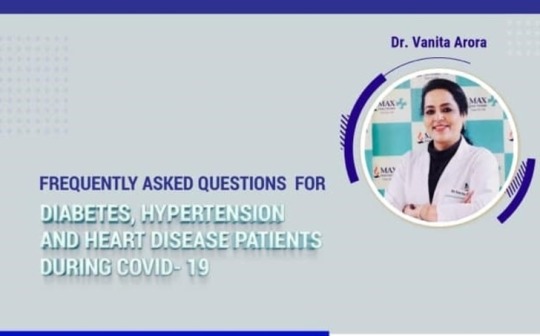
Coronavirus has everyone's attention. Everyone is being cautious and people with heart diseases have more reasons to be cautious.
Individuals who are above 65 with hypertension, diabetes or are suffering from any heart related illnesses, the concern is serious as they may develop more severe symptoms.
The virus could affect heart disease patients in several ways, said Dr Vanita Arora India’s best cardiac electrophysiologist and interventional cardiologist.
Any individual can contact the virus in the same manner, i.e., via droplets in the air from an infected person coughing, sneezing, talking or via touching contaminated surfaces.
It directly infects the lungs, as a result of which there occurs a drop in the blood oxygen level. The inflammatory effect of the virus itself can cause the blood pressure to drop. In such cases, the heart must beat faster and harder to supply oxygen to major organs.
During this scenario, people with existing heart problems where pumping of the heart is inefficient, this virus can cause a severe and rapid deterioration.
People with chronic medical conditions and existing heart issues may also have a less robust immune system and their body’s immune response may not be as strong when exposed to coronavirus, said Dr Vanita Arora, a cardiac electrophysiologist and heart specialist in Delhi, India.
Dr Arora added that people who have fatty buildup in their arteries, also known as plaques, may also be at risk from this virus. Research indicates that viral illnesses may destabilize these plaques, possibly contributing to blockage of artery supplying blood into the heart, thus putting patients at risk of heart attack.
One challenge that heart specialists may face is that previous viruses that affected the society at large, such as SARS, MERS offered more insights as compared to Coronavirus, for which information is changing almost every hour. Previous respiratory illness related viruses like SARS and MERS were also linked to problems such as inflammation of the heart muscle, heart attack and rapid-onset heart failure.
Dr. Arora, who is also the best cardiac electrophysiologist in India, mentioned that there are no special protocols for higher-risk cardiac patients, but they should be more careful in protecting themselves by staying at home, maintaining social distances, washing hands regularly, keeping surfaces clean.
She added, in addition to these recommendations, it is extremely important to exercise (can practice breathing exercise at home), get enough sleep, manage stress, and eat a balanced diet. These healthy habits will help to bolster the immune system in the longer term.
For further details about electrophysiology and heart related disorders, you may contact Dr. Vanita Arora, the best cardiac electrophysiologist and interventional cardiologist in Delhi, India.
#electrophysiology#cardiologist#coronavirus#covid19#heart specialist#pacemaker#arrhythmia#cardiac electrophysiologist
1 note
·
View note
Text
Guard yourself against sudden cardiac arrest: Beware of palpitations
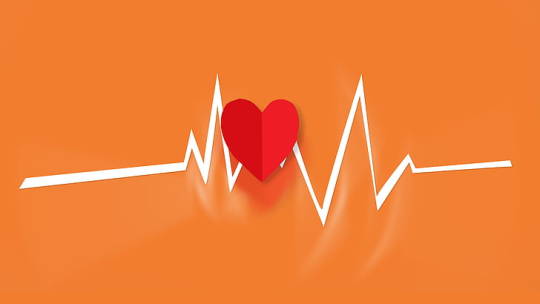
Fluttering of your heart is not always a sign of love, nor is skipping of a beat. The fluttering could be a sign that you need to pay attention to your heart. So what if your health parameters are more or less fine, but if your heart is not beating right, it is reason enough to see a doctor. Dr. Vanita Arora, the best cardiologist in India suggests that Arrhythmias, also called irregular heartbeats, fluttering, palpitations, and so on, can put you in grave danger, even causing a sudden cardiac arrest. Unfortunately, in India, we do not have a national registry for cardiac deaths, so it is difficult to predict the number of people dying due to SCDs. But a look at the macro factors removes any doubt whether Indians are at the brink of cardiac emergency. An Indian study of cardiac electrophysiologists research in the year 2016 showed cardiovascular diseases (CVD) kill 1.7 million Indians every year.
What is abnormal beating of the heart?
Our heart beats regularly and non-stop while we are alive. It keeps on pumping blood — even when we suffer a heart attack, the pumping of blood does not stop. Our normal heart-beating rhythm is around 60 to 100 beats per minute when the body is at rest. The rhythm can vary if a person does some extra physical work or is under the effect of some emotional or psychological stimulus. But arrhythmia, a speciality of cardiac electrophysiologists in India, is much different — it is the change in our normal heartbeat that is triggered by an alteration in the sequence of the electric impulses our heart receives. If a person is suffering from this condition, it is best advised to seek the help of the best cardiologist in India for medical treatment.
Palpitations triggering cardiac arrest
When the heart is not functioning properly for a prolonged period, it gives rise to a situation that may lead to sudden cardiac arrest, which is different from a heart attack. A sudden cardiac arrest means that the heart has suddenly stopped functioning due to irregularity of electric impulses. A sudden cardiac arrest leads to almost instantaneous death. A person who is suffering from cardiac arrhythmia for a long time is at a high risk of cardiac arrest as the electric system of the person is not functioning properly. Some of the common symptoms of various forms of irregular heart beat include breathlessness, dizziness, fluttering in the chest or irregular heartbeats even in normal circumstances. Other symptoms include chest pain, palpitations, sweating, and confusion. In case the symptoms are detected, the patient should be taken to a cardiologist or a cardiac electrophysiologist doctor.
A proper check-up from a cardiac electrophysiologist will help determine whether arrhythmia is dangerous or not. With due medications, increased physical activity, certain dietary changes, periodic monitoring of pulse, and managing risk factors can ensure a person continues to live with a healthy heart.
‘Dr. Vanita Arora, is the best cardiologist doctor in India. She is the first female cardiac electrophysiologist in India and currently the Director and Head of Cardiac Electrophysiology Lab and Arrhythmia Services at Max Hospital, Saket, Delhi. She has been the first one in Asia Pacific to do the Live Case of a leadless pacemaker. Dr. Arora has earned Awards like ”Rising Star in Cardiology”, “Woman Doctor Entrepreneur of year 2018”, “Chikitsa Ratan” along with several other outstanding achievements in her medical career of more than two decades.’
2 notes
·
View notes
